2017 Student Cohort
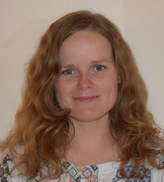
Susanna (Suzie) Brown, University of Warwick
Suzie grew up near Cambridge UK. She did her undergraduate studies in Mathematics at the University of Bristol, gradually specialising towards probability and statistics. Her thesis, entitled 'Hamiltonian Monte Carlo: Theory & Practice', won the prize for the best statistical project. As suggested by the title, the thesis encompassed both theoretical results and practical considerations, culminating in a series of experiments comparing HMC to other Monte Carlo methods. Suzie remains interested in Monte Carlo methods, although she is still torn between the theoretical and applied aspects. In her free time Suzie enjoys baking, singing, and setting or solving puzzles.
Suzie grew up near Cambridge UK. She did her undergraduate studies in Mathematics at the University of Bristol, gradually specialising towards probability and statistics. Her thesis, entitled 'Hamiltonian Monte Carlo: Theory & Practice', won the prize for the best statistical project. As suggested by the title, the thesis encompassed both theoretical results and practical considerations, culminating in a series of experiments comparing HMC to other Monte Carlo methods. Suzie remains interested in Monte Carlo methods, although she is still torn between the theoretical and applied aspects. In her free time Suzie enjoys baking, singing, and setting or solving puzzles.
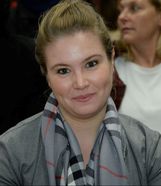
Francesca Crucinio, University of Warwick
Francesca is from Torino, Italy. She studied Mathematical Engineering at Politecnico di Torino, focusing on networks, statistics and optimization. In 2015 she had the opportunity to spend a semester studying at Queen Mary University of London, where she developed an interest in computational statistics. In October 2016 she got a Master’s degree with a final project on Markov Chain Monte Carlo Algorithms to perform two sample hypothesis tests. She spent the following year working on the same topic, investigating the links of the algebraic-based MCMC test with well-known exact tests and standard permutation test. This work motivated Francesca’s interest in Monte Carlo methods and led her to join the OxWaSP programme.
Francesca is from Torino, Italy. She studied Mathematical Engineering at Politecnico di Torino, focusing on networks, statistics and optimization. In 2015 she had the opportunity to spend a semester studying at Queen Mary University of London, where she developed an interest in computational statistics. In October 2016 she got a Master’s degree with a final project on Markov Chain Monte Carlo Algorithms to perform two sample hypothesis tests. She spent the following year working on the same topic, investigating the links of the algebraic-based MCMC test with well-known exact tests and standard permutation test. This work motivated Francesca’s interest in Monte Carlo methods and led her to join the OxWaSP programme.
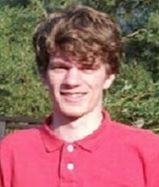
James Hodgson, University of Warwick
James did his undergraduate maths course at Cambridge, during which his interest slowly drifted from pure maths to applied maths to statistics (where they finally came to rest). He continued there for Part III, writing a master's essay on recent algorithmic developments in deep reinforcement learning. Outside term-time he has tended to wander out of the maths department, taking part in projects in ecological modelling and computer network emulation. He is most interested in Bayesian inference and machine learning. In his spare time he is usually playing the flute, cooking with more enthusiasm than talent, or reading things he doesn't quite understand.
James did his undergraduate maths course at Cambridge, during which his interest slowly drifted from pure maths to applied maths to statistics (where they finally came to rest). He continued there for Part III, writing a master's essay on recent algorithmic developments in deep reinforcement learning. Outside term-time he has tended to wander out of the maths department, taking part in projects in ecological modelling and computer network emulation. He is most interested in Bayesian inference and machine learning. In his spare time he is usually playing the flute, cooking with more enthusiasm than talent, or reading things he doesn't quite understand.

Jingyue (Jodie) Lu, University of Oxford
Jingyue studied at the Australian National University, where she obtained a BSc (Hons) in Mathematics with emphasis on Computational Mathematics. During her honours year, she worked on deriving computationally efficient solution of large scale optimisation problems and became interested in data analysis and interpretation over time. She then completed an MPhil in Statistics prior to joining the OxWaSP programme. For her master project, she focused on sufficient dimension reduction techniques, which analyse data by combining the ideas of dimension reduction and the concept of sufficiency. Jingyue is particularly interested in large scale data analysis and machine learning techniques. Outside of research, she enjoys running and travelling.
Jingyue studied at the Australian National University, where she obtained a BSc (Hons) in Mathematics with emphasis on Computational Mathematics. During her honours year, she worked on deriving computationally efficient solution of large scale optimisation problems and became interested in data analysis and interpretation over time. She then completed an MPhil in Statistics prior to joining the OxWaSP programme. For her master project, she focused on sufficient dimension reduction techniques, which analyse data by combining the ideas of dimension reduction and the concept of sufficiency. Jingyue is particularly interested in large scale data analysis and machine learning techniques. Outside of research, she enjoys running and travelling.
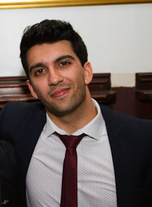
Cian Naik, University of Oxford
I originally come from Canada but have lived in London for most of my life. I did my undergraduate degree in mathematics at Cambridge, focussing on statistics and probability in my final year, before moving to Imperial to complete my masters in statistics. My MSc thesis was on robust estimation and approximate Bayesian methods in causal inference problems. After finishing my masters, I spent a year interning in investment management and also in sports modelling. My current research interests lie in causal inference and Monte Carlo methods in high dimensional problems. In my free time, I play a lot of hockey, and also enjoy other sports like tennis and squash.
I originally come from Canada but have lived in London for most of my life. I did my undergraduate degree in mathematics at Cambridge, focussing on statistics and probability in my final year, before moving to Imperial to complete my masters in statistics. My MSc thesis was on robust estimation and approximate Bayesian methods in causal inference problems. After finishing my masters, I spent a year interning in investment management and also in sports modelling. My current research interests lie in causal inference and Monte Carlo methods in high dimensional problems. In my free time, I play a lot of hockey, and also enjoy other sports like tennis and squash.
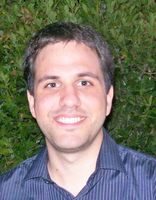
Marco Palma, University of Warwick
Marco comes from Italy. He completed a Master’s degree in Statistical Sciences at the University of Bologna, with the final thesis written at LMU - Munich about regression models for multivariate functional data with application to brain images. In addition, as a student admitted to the Collegio Superiore he had the opportunity to apply its statistical background in an interdisciplinary environment, working on several topics ranging from pain medicine to translation studies. Marco is interested in developing high dimensional inferential methods for biomedical applications. Apart from his research interests, he also likes teaching and trying to communicate statistical concepts to young students. In his free time, he enjoys playing the guitar, singing and playing card games.
Marco comes from Italy. He completed a Master’s degree in Statistical Sciences at the University of Bologna, with the final thesis written at LMU - Munich about regression models for multivariate functional data with application to brain images. In addition, as a student admitted to the Collegio Superiore he had the opportunity to apply its statistical background in an interdisciplinary environment, working on several topics ranging from pain medicine to translation studies. Marco is interested in developing high dimensional inferential methods for biomedical applications. Apart from his research interests, he also likes teaching and trying to communicate statistical concepts to young students. In his free time, he enjoys playing the guitar, singing and playing card games.
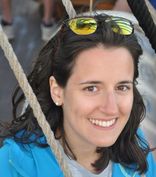
Francesa Panero, University of Oxford
Francesca studied at the University of Turin, Italy, where she obtained her Bachelor and Master of Science, the former in Mathematics and the latter in Stochastics and Data Science with a thesis entitled 'A nonparametric empirical Bayes approach to disclosure risk assessment'. In parallel to her university degree, she was Allievo of the Honors Programme at Collegio Carlo Alberto, where she pursued a Diploma in Economics and a Master in Statistics and Applied Mathematics. Francesca's various interests lie in particular in Bayesian statistics, both parametric and nonparametric. In her free time, she loves travelling, she sings and directs a choir, and she also volunteers for some associations.
Francesca studied at the University of Turin, Italy, where she obtained her Bachelor and Master of Science, the former in Mathematics and the latter in Stochastics and Data Science with a thesis entitled 'A nonparametric empirical Bayes approach to disclosure risk assessment'. In parallel to her university degree, she was Allievo of the Honors Programme at Collegio Carlo Alberto, where she pursued a Diploma in Economics and a Master in Statistics and Applied Mathematics. Francesca's various interests lie in particular in Bayesian statistics, both parametric and nonparametric. In her free time, she loves travelling, she sings and directs a choir, and she also volunteers for some associations.
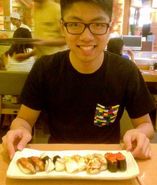
Jean-François Ton, University of Oxford
Jean-François is from Luxembourg. He moved to London to read Mathematics and Statistics at Imperial College London and then went on to study the MSc in Applied Statistics at the University of Oxford. His Master Thesis entitled ‘Non-Stationary Fourier Features for Spatio-Temporal Modelling’ discussed non-stationary kernel learning and estimations, as well as their application on real datasets. During his previous summers, Jean-François did two research projects as part of the UROP (Undergraduate Research Opportunity Program) at Imperial. Currently, he is especially interested in Machine Learning and Kernel methods, but is eager to learn about new topics at the CDT. In his spare time, he enjoys playing table tennis and eating good food.
Jean-François is from Luxembourg. He moved to London to read Mathematics and Statistics at Imperial College London and then went on to study the MSc in Applied Statistics at the University of Oxford. His Master Thesis entitled ‘Non-Stationary Fourier Features for Spatio-Temporal Modelling’ discussed non-stationary kernel learning and estimations, as well as their application on real datasets. During his previous summers, Jean-François did two research projects as part of the UROP (Undergraduate Research Opportunity Program) at Imperial. Currently, he is especially interested in Machine Learning and Kernel methods, but is eager to learn about new topics at the CDT. In his spare time, he enjoys playing table tennis and eating good food.

Tomas Vaskevicius, University of Oxford
Tomas is from Lithuania and did his 4 year undergraduate degree in Mathematics and Computer Science at the University of Oxford. During his studies he enjoyed courses on Probability and Machine Learning which sparked his interest in Statistics. Consequently, his final year Computer Science project consisted of implementing a C++ library for efficient simulation of arbitrary piecewise-deterministic Markov processes which can be used to perform MCMC sampling. Right now Tomas is mostly excited about scaling Monte Carlo methods on multi-core architectures. Besides his academic interests, he enjoys playing basketball.
Tomas is from Lithuania and did his 4 year undergraduate degree in Mathematics and Computer Science at the University of Oxford. During his studies he enjoyed courses on Probability and Machine Learning which sparked his interest in Statistics. Consequently, his final year Computer Science project consisted of implementing a C++ library for efficient simulation of arbitrary piecewise-deterministic Markov processes which can be used to perform MCMC sampling. Right now Tomas is mostly excited about scaling Monte Carlo methods on multi-core architectures. Besides his academic interests, he enjoys playing basketball.

Fan Wu, University of Oxford
Fan is from Germany, where he studied Mathematics and Economics at the University of Bonn. He became interested in probability theory, and his thesis was o perturbation theory for Markov chains. In particular, the convergence of Markov chains with a transitional kernel ‘close’ to a reference kernel was studied, and this was applied to approximate MCMC algorithms. He then did the MSc in Applied Statistics at Oxford, and his dissertation focused on irreversible parallel tempering algorithms, which aim at suppressing the random walk behaviour exhibited by the replicas in the temperature space and improving mixing. In his free time Fan enjoys playing piano, badminton and board games.
Fan is from Germany, where he studied Mathematics and Economics at the University of Bonn. He became interested in probability theory, and his thesis was o perturbation theory for Markov chains. In particular, the convergence of Markov chains with a transitional kernel ‘close’ to a reference kernel was studied, and this was applied to approximate MCMC algorithms. He then did the MSc in Applied Statistics at Oxford, and his dissertation focused on irreversible parallel tempering algorithms, which aim at suppressing the random walk behaviour exhibited by the replicas in the temperature space and improving mixing. In his free time Fan enjoys playing piano, badminton and board games.

Xuewen Yu, University of Warwick
Xuewen is from China. She graduated from the University of Warwick in MORSE (Mathematics, Operational Research, Statistics and Economics) and completed her masters degree in Applied Statistics at the University of Oxford. Her dissertation adapted Approximate Bayesian Computation (ABC) algorithms, combined with Markov Chain Monte Carlo (MCMC) method, to estimate the topology of phylogenetic tree and applied the algorithms to Eastern Polynesian data to analyse the evolution of languages. Xuewen's research interest lies in simulation techniques, in particular, Monte Carlo method. She is also interested in machine learning. In her free time, she enjoys listening to music and going to concerts.
Xuewen is from China. She graduated from the University of Warwick in MORSE (Mathematics, Operational Research, Statistics and Economics) and completed her masters degree in Applied Statistics at the University of Oxford. Her dissertation adapted Approximate Bayesian Computation (ABC) algorithms, combined with Markov Chain Monte Carlo (MCMC) method, to estimate the topology of phylogenetic tree and applied the algorithms to Eastern Polynesian data to analyse the evolution of languages. Xuewen's research interest lies in simulation techniques, in particular, Monte Carlo method. She is also interested in machine learning. In her free time, she enjoys listening to music and going to concerts.

